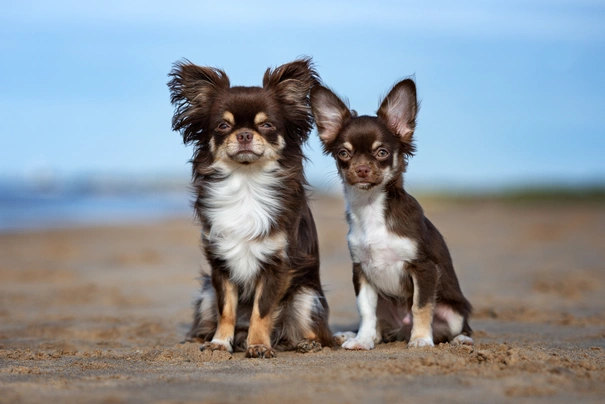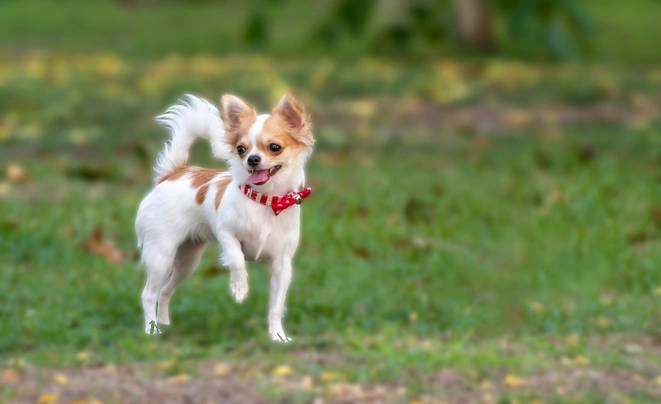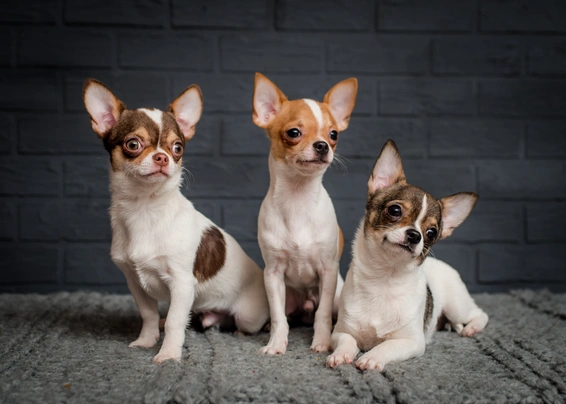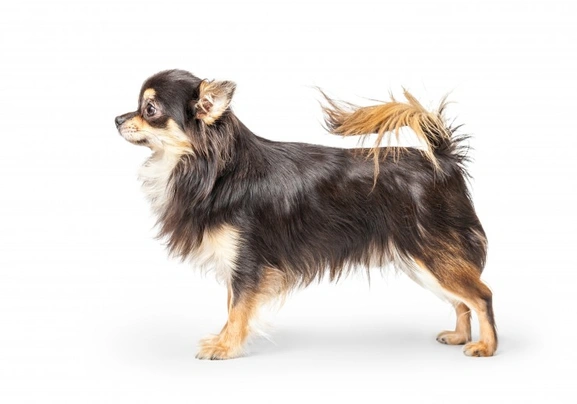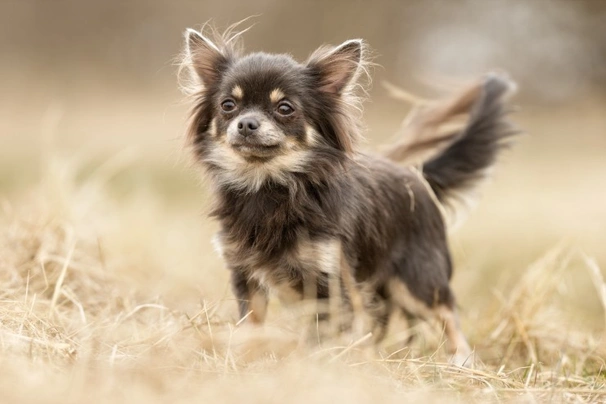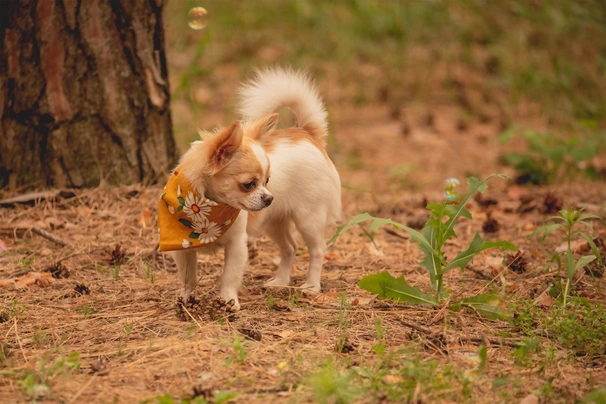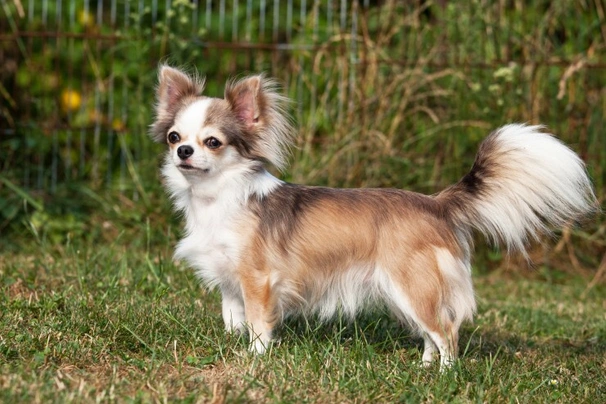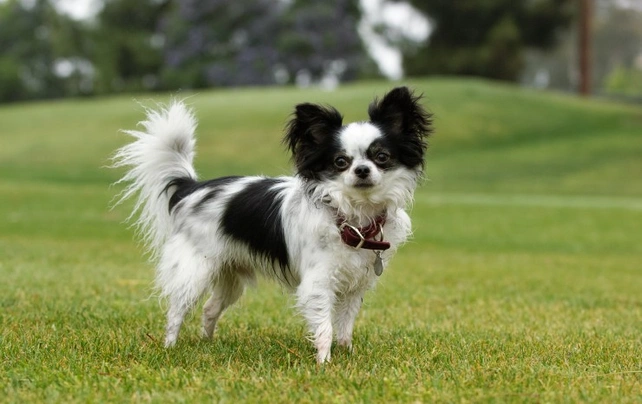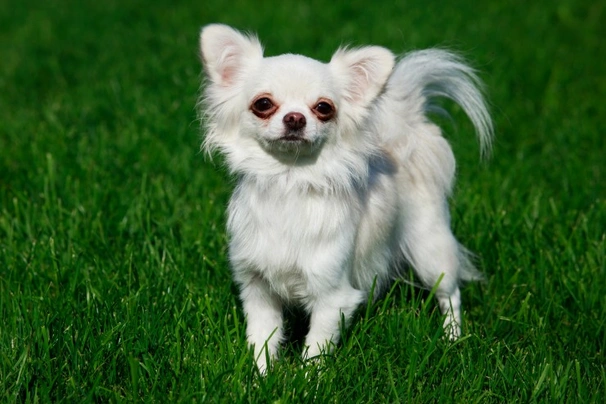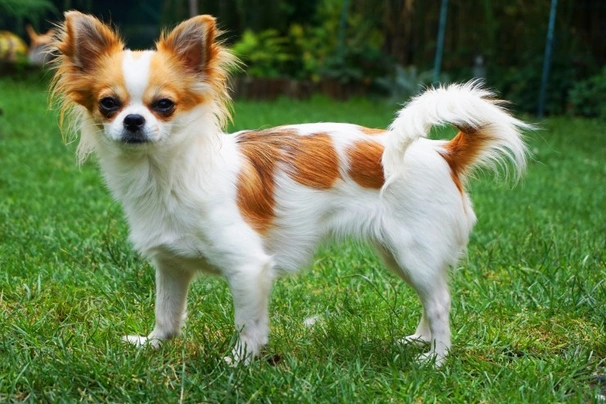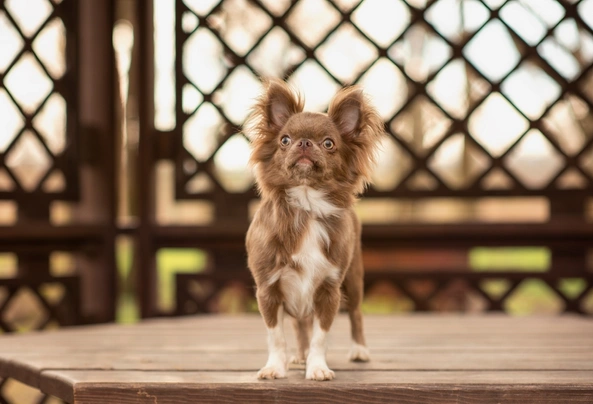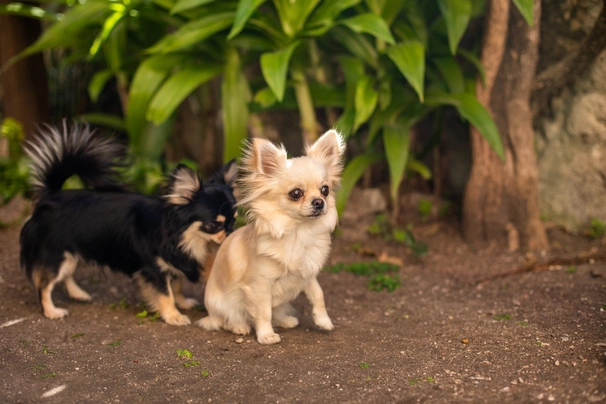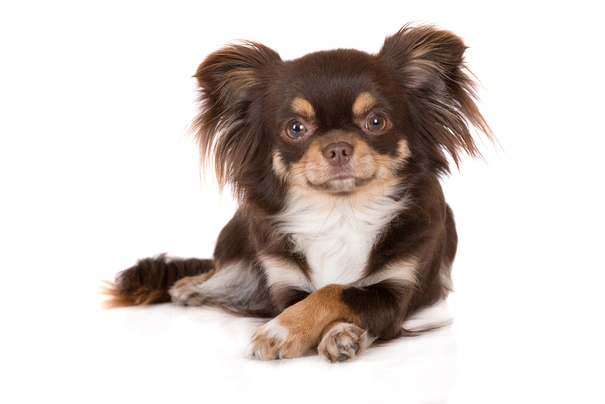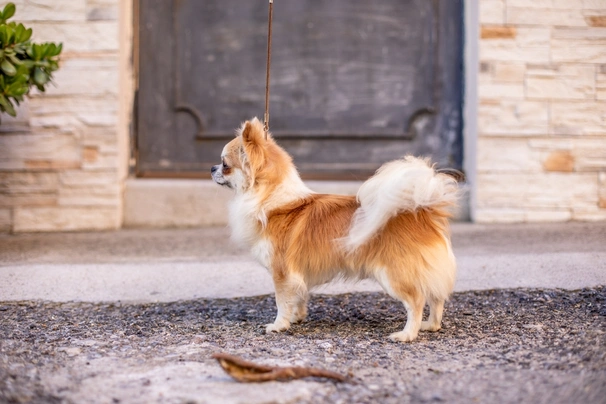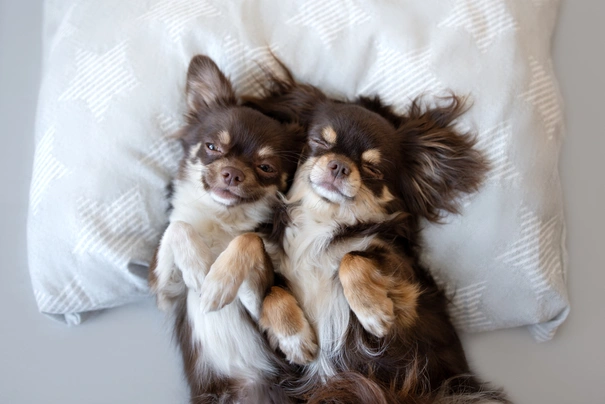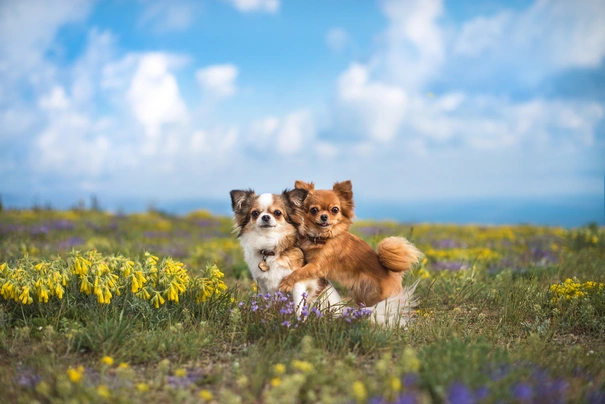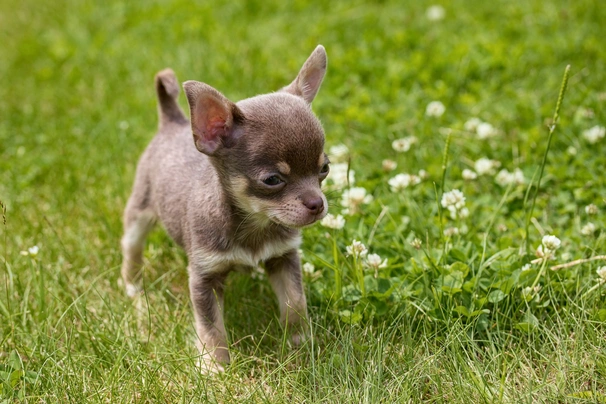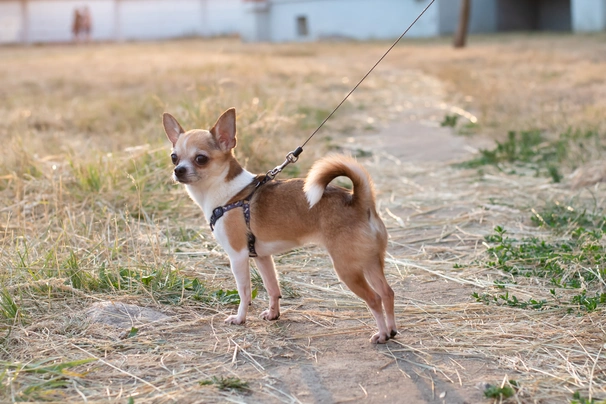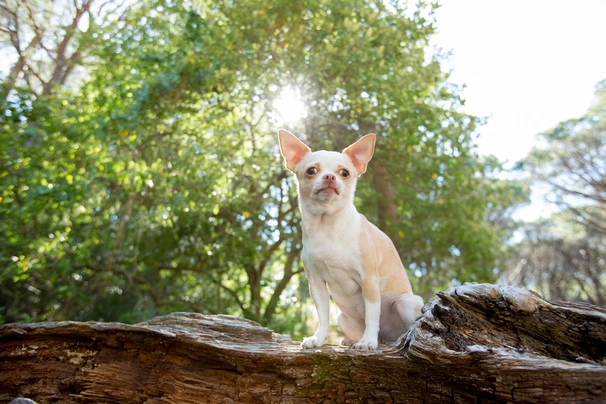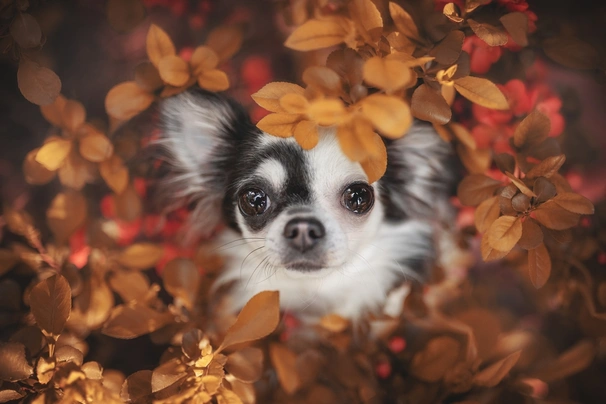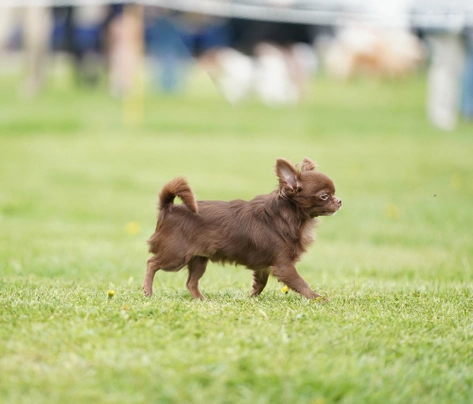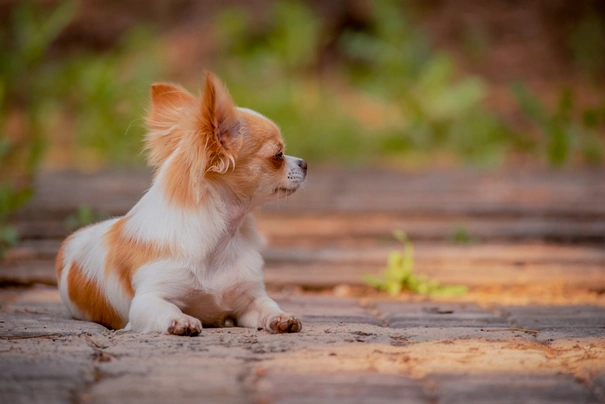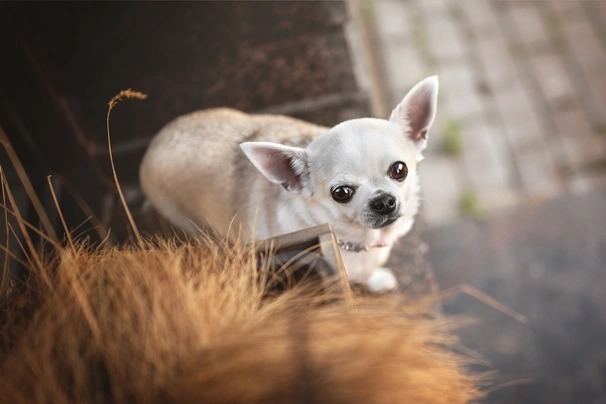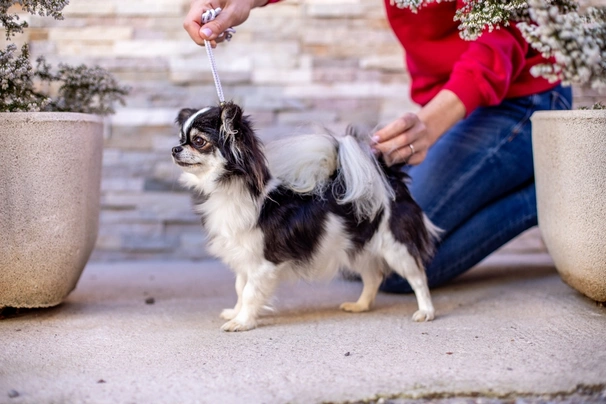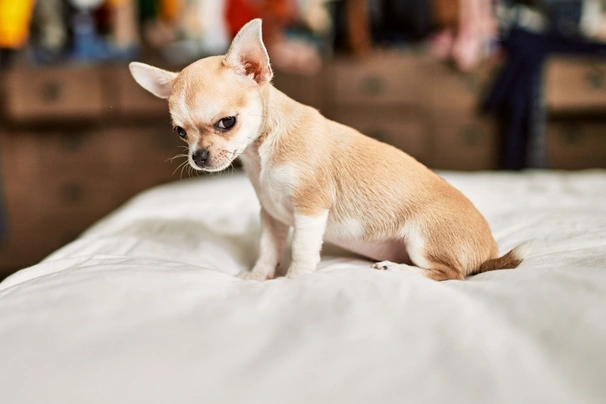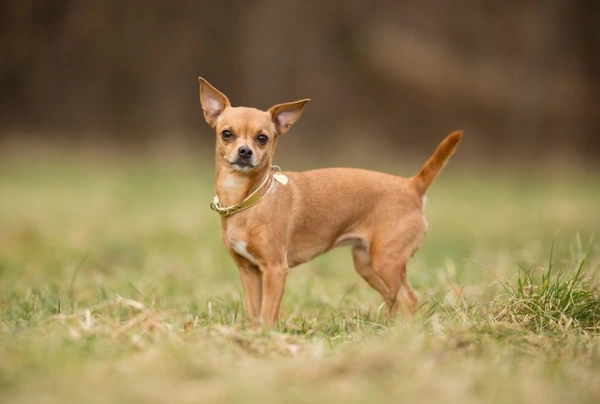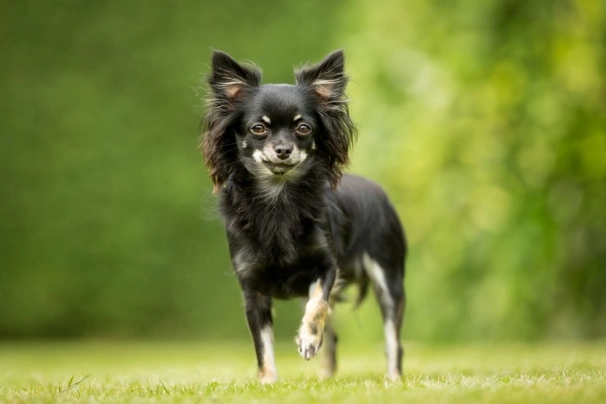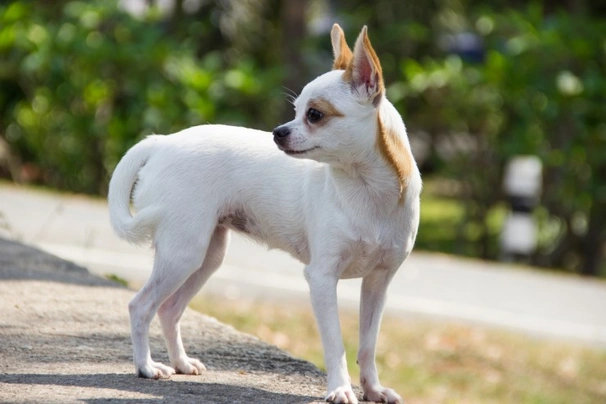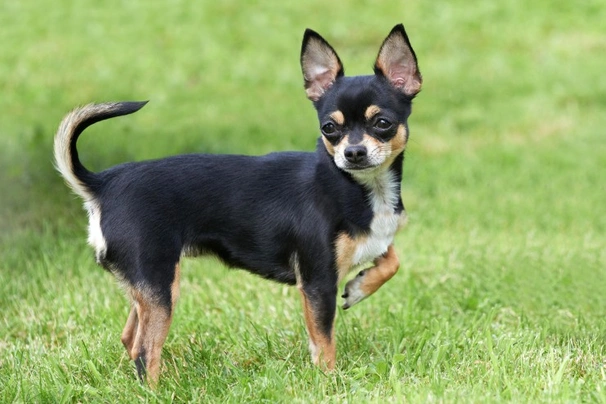Chihuahua
Pros
Cons
Introduction of the Chihuahua
Over the years Chihuahuas have found their way into the hearts and homes of many people around the world. The breed hails from Mexico where they have always been highly prized for their cuteness their intelligence and the fact these tiny characters think they are bigger than they really are. One thing a Chihuahua is not and that is purely a lapdog. Bursting with energy and character these little dogs are great fun to share a home with. They are fiercely courageous and will stand their ground no matter what. They are also loyal and affectionate characters liking nothing more than to spend as much time with their owners as they possible can which means Chihuahuas do not tolerate being left on their own for any great length of time.
History of the Chihuahua
Although there is still some discussion as to how the Chihuahua first came about whether they first appeared in Europe or Mexico it seems the latter is the most likely thanks to archaeological finds and local Mexican folk tales. There is some belief that the breed is a descendant of dogs that were around in ancient times when a Mexican civilisation known as the Toltec kept very similar looking tiny dogs called the Techichi. This theory on the origins of the Chihuahua is supported by dog burials found that date back to 300 BC.
With this said there are other people who think the breed first appeared either in Spain or Malta with very similar looking dogs appearing in paintings and frescoes of the time. These images were done before Christopher Columbus came back from his voyage to the "New World" which means the Chihuahua existed in these regions of the world before his epic voyages across the Atlantic.
The first records of the modern Chihuahua date back to the 1800's when entrepreneurial Mexicans began selling these tiny dogs to tourists who were visiting the country. The first Chihuahua named "Midget" was registered in the US in 1904 and the popularity of the breed took off from that point on. They were especially popular with ladies who wanted tiny companion dogs. It was not until the 1800s that Chihuahuas became a popular choice in the UK but it did not take long before these tiny dogs became a firm favourite elsewhere in the world too. Below are some interesting facts about the breed.
Interesting facts about the breed
In 1948 a Texan Senator wanted to pass a State Legislation that would make the Chihuahua the official state dog because he loved the breed so much. His argument was that although Chihuahuas came from Mexico so did Texas.
The breed was first exhibited in the UK at Crufts in 1936.
The Chihuahuas we see today are not descendants of dogs that were introduced to the UK before 1945. The renaissance of Chihuahuas did not occur until 1949 when a breed enthusiast called Mr. DC Gott bred and registered the first female puppy called Una of Phoenix. The first male pups to be registered with the Kennel Club were called Tizoc and Chico of Belamie.
Chihuahuas are thought to be the only domestic breed of dog indigenous to the continent of America.
It was not until 1953 that the Kennel Club recognised Chihuahuas as a breed because before that the breed was classified under "Any Other Variety".
Appearance of the Chihuahua
Height at the withers: Males 15 - 25 cm Females 15 - 25 cm
Average weight: Males 1.8 - 2.7 kg Females 1.8 - 2.7 kg
Chihuahuas are best described as being compact small and dainty dogs that boast feisty personalities. They have nicely rounded heads with short slightly pointed muzzles and well-defined jaw lines. They also boast well defined stops which adds to their overall cute appeal. Their eyes are large and round set well apart on a dog's head and they can either be dark or ruby in colour although some Chihuahuas have lighter coloured eyes which is acceptable as a breed standard.
Their ears are large and they flare out being set at an angle of 45 degrees on a dog's head. Chihuahuas have a strong jaw line with a perfect and regular scissor bite where their upper teeth snugly overlap their lower ones. They hold their necks slightly arched and their shoulders are well laid back. Front legs are straight and set well under a dog's chest which allows for a lot of free movement.
As previously mentioned the Chihuahua is a compact little dog and they boast nice proportions for their size. Their backs are level and they have well sprung rib cages and deep briskets. Hindquarters are well-muscled and their back legs are strong and muscular. A Chihuahua's feet are very small and dainty with nicely divided toes and well cushioned paw pads and neat nails. Their tail is medium in length and set high which dogs carry over their backs.
When it comes to their coat Chihuahuas can either be smooth coated or long coated with hair that is soft to the touch and which has a natural sheen. Undercoats and ruffs are allowed as a breed standard. These tiny dogs come in a lot of colours and the only one that is never allowed is "merle". Acceptable colours include the following:
- Black
- Black & tan
- Black & white
- Black Particolour
- Blue
- Blue & Tan
- Blue & White
- Blue Fawn
- Blue Fawn & White
- Blue Fawn Sable
- Blue Sable
- Blue Sable & White
- Chocolate
- Chocolate & Gold
- Chocolate & Tan
- Chocolate Tan & White
- Cream
- Cream & White
- Cream Sable
- Dark Sable
- Fawn
- Fawn & White
- Fawn Sable
- Gold
- Gold & White
- Gold Sable
- Red
- Red & White
- Red Sable
- Red Sable & White
- Sable
- Sable & White
- Tricolour
- White
- White & Chocolate
- Wolf Sable
Differences between Chihuahua Apple and Deer Shaped Heads
A Chihuahua can either have an "Apple" head or their heads can be "Deer" shaped although the preferred shape under the Kennel Club breed standard is the former namely Apple which sees Chis with quite exaggerated rounded heads. With this said a lot of Chis have less pronounced dome shapes to their heads which although not as desirable is perfectly acceptable under the KC standard as are dogs with Deer shaped heads.
It is worth noting that Chis with Deer shaped heads are less likely to develop certain health issues which seem to plague dogs with Apple shaped heads although the latter would do a lot better in the showring. Another point to bear in mind that dogs with Apple shaped heads have a hole at the top of the skulls which are known as moleras and great care must be taken when handling them because often the hole remains open throughout a dog’s life and as a result they are more susceptible to certain injuries. Chihuahuas with Deer shaped heads do not have the same problem.
Read more about the differences in head shapes in our article here.
Gait/Movement
Chihuahuas are typically full of self-importance and they move accordingly. Their gait is confident brisk full of purpose without being too hackneyed or high-stepping. Their reach is positive both in their forequarters and hindquarters and when seen from the front and behind their legs should not move too far apart or be too wide either. Feet and pasterns should not turn in or out and their toplines should always be firm and level when dogs are moving.
Faults
Any exaggerations or departures from the Kennel Club breed standard would be thought of as a serious fault because it could affect the health and welfare of a Chihuahua. Male should always have two normal testicles that have fully descended into their scrotums.
It is also worth noting that a Merle Database was established because Merle Chihuahuas are no longer recognised by the Kennel Club and it was set up so that breeders as well as members of the British Chihuahua Breed Club had a reference point to use to ensure that dogs used for breeding purposes did not introduce any merle-lines into their stock. The database is also a good reference point for potential buyers to check when considering buying a Chihuahua puppy.
Temperament of the Chihuahua
Chihuahuas should definitely not be thought of as just lapdogs they are alert quick and feisty little characters that stand up for themselves when they feel they have to. They are a "big" dog in a small body and will take on the world without any hesitation. However they are not "snappy" or withdrawn dogs but rather spirited and highly intelligent which are just some of the reasons why they have remained such popular companion dogs.
They are quite wary and cautious by nature but when they get to know a person they are fine around them. They are known to size up a situation or person which is a "self-preservation" trait seen in many of the breed. They are also known to have a bit of a stubborn streak in them. However when well socialised and correctly trained these little dogs become loyal and loving companions that are a joy to have around.
The one thing to bear in mind is that if not well handled and trained from a young age Chihuahuas can become a little dominant and therefore unruly and harder to manage. All too often if they are spoilt these little dogs can become a little defensive and protective of their owners.
Over the years and as better breeding practices were established through recognised and well-established UK breeders the Chihuahuas we see today are known for their better temperaments than Chis of the past. This is thanks to careful and selective breeding. The Chihuahua breed standard today clearly states that a Chi's temperament should be "gay spirited and intelligent" so not only does conformation play an important role in their breeding but temperament is an all-important factor too.
It is worth noting that Chihuahuas are cautious by nature and that they prefer to size things up before they do anything which includes approaching people they don't already know. In short Chis like to do things at their own pace and in their own time. Once they are happy about a situation and a person they relax and become a lot more responsive. These little dogs are incredibly sensitive and if anyone holding their leads feels tense or stressed out in any way they will pass these feeling down through the lead to a Chi and they will react accordingly. Chihuahuas don't like loud noises either which is another thing that can make them very nervous. With this said Chihuahuas are inquisitive by nature and being so intelligent they quickly catch on to things which includes the good and the bad.
Chihuahuas like having company around whether it's a person or the company of another dog and ideally that of another Chi. If left on their own for any length of time they are prone to suffering from separation anxiety which can result in dogs being destructive around the home. It is also worth noting that males are just as affectionate and loyal as their female counterparts.
Are they a good choice for first time dog owners?
Chihuahuas are not the best choice for first time dog owners because they can be a little bit of a challenge when it comes to training them thanks to the fact they are quite independent thinkers by nature and like to do things in their own time. They can be harder to housetrain than many other small breeds too which means it often takes longer and requires a lot more patience when teaching a Chi to do their "business" outside.
What about prey drive?
Chis will chase other animals when they get the chance especially if they have well socialised and therefore more confident which often means a Chihuahua has no real idea of their real size. As such care should always be taken when a Chihuahua first meets any other pets and animals to avoid them chasing them away and this includes larger breeds.
What about playfulness?
Providing a Chihuahua has been well bred and socialised from a young age they are confident outgoing and playful by nature. The thing to remember is that it takes these little dogs take their time to feel comfortable around people they don't know and they also like to acclimatize themselves to new environments and situations but once they feel comfortable they can be real clowns and love nothing more than to play lots of interactive games with their families and owners.
What about adaptability?
Chihuahuas can be wary of new things and people they don't know but they are intelligent and as such will adapt to a new environment but they like to do things in their own time. With this said they are just as happy living in an apartment as they are living in a house with a garden providing they are given the right amount of mental stimulation and daily exercise and the garden is secure enough for these little dogs to roam around in safely.
Chihuahuas being such small dogs feel the cold but it would be a mistake to mollycoddle them although wearing a coat when out on a walk will certainly keep a Chi nice and warm when the temperatures are low. Providing they are not left for too long in a secure back garden when they need to do their "business" a Chi would come to no harm if they are let out during the colder winter months without a coat on.
What about separation anxiety?
Chihuahuas do not like finding themselves on their own and if they do they get very stressed out and anxious which can result in them being noisy and destructive around the home. This is typical behaviour of a dog that is suffering from a condition known as separation anxiety. As such they are better suited to households where at least one family member stays at home when others are out of the house or where there is another dog so a Chi always has company around.
What about excessive barking?
Chis are clever little dogs and although some of them may bark more than others they can be taught not to bark for no reason. The key to successfully training a Chihuahua not to be "yappy" is to start their education early and to gently curb their need to bark right from the word go without scaring them into never barking at all.
Do Chihuahuas like water?
Chihuahuas are such small dogs that care should be taken whenever they are being walked or exercised anywhere near water just in case they fall in. With this said Chis are not particularly fond of water and tend to keep well away from it even when they are walked along a beach.
Intelligence / Trainability of the Chihuahua
Chihuahuas are clever little dogs but training needs to start early and it's essential for puppies to be well socialised from a young age for them to grow up to be well-rounded dogs. They may be small in stature but their looks and size are deceiving and it would be a mistake to "spoil" a Chihuahua by letting them get away with too much just because they are so cute. Being consistent and having the time to train a Chihuahua right from day one is the key to them growing up to being well behaved housetrained dogs.
With this said it takes time and patience to train a Chihuahua because although they are so intelligent they are independent thinkers by nature and like to do things at their own pace which includes responding to commands when they are first being taught them. However the rewards of doing things properly when training a Chi are exceptional. The key to successfully training one of these small dogs is to take your time and to go through a short training routine every day starting with the following commands:
- No
- Down
- Sit
- Quiet
- Out
- Come
- Bedtime
- Good dog for positive reinforcement
- Bad dog - only when necessary and never said with a raised voice or too harshly
It is well worth noting that teaching a Chi to retrieve anything can prove extremely challenging because they are more than likely to simply sit and look at an owner when they throw anything for them with a look on their faces that clearly states "you fetch it because you who threw it!" and this can be put down to that little stubborn streak that most Chihuahuas have in them.
Children and other
Chihuahuas are not the best choice for people with young families because small children and toddlers might be a little too rough around these tiny dogs which could result in them scaring or injuring their pet bearing in mind that Chihuahuas are little dogs and can therefore be easily trodden on especially if a situation is a little too hectic and they get anxious and nervous about things. Any interaction between a Chihuahua and a child should always be well supervised by an adult. Chihuahuas are very smart and are wary of toddlers and smaller kids because they seem to instinctively know just how vulnerable they are.
When it comes to other dogs Chihuahuas are generally good around them especially if they have grown up with another of their kind or a different breed of dog. When it comes to cats and smaller pets again they are usually okay if they have grown up with them but may just want to chase an unfamiliar cat if they dare to come into a Chihuahua’s garden.
Health of the Chihuahua
The average life expectancy of a Chihuahua is between 10 and 18 years when properly cared for and fed an appropriate good quality diet to suit their ages.
These tiny dogs are remarkably healthy and sturdy considering their size but they are known to suffer from certain hereditary and congenital disorders that are worth knowing about if you are hoping to share your home with one of them. The health issues that seem to affect the breed the most include the following:
- Patella luxation
- Epilepsy
- Hydrocephalus(Fluid Buildup inseide Skull)
- Hypoglycemia (Low blood sugar)
- Eye infections and injuries to the eye
- Ear problems
- Puppies are born with a molera (fontanelle)
Chihuahuas are the only breed that’s born with an underdeveloped skull which as a result is not completely formed. It is only as puppies grow that their skulls finish developing and as such care should be taken during the first few months of their lives to avoid injuring a puppy. Many vets who are not familiar with the breed as well as inexperienced breeders often confuse a skull that’s not fully developed with a condition which is known as Hydrocephalus.
Because Chihuahuas have such large eyes and because they are not very big dogs they are that much lower to the ground and as such they often get dirt dust and debris in their eyes which can lead to a painful irritation. As a result their eyes water which causes excessive tear staining. It's a good idea to gently wipe a Chis eyes several times a day and to use a gentle barrier on the skin under their eyes to help reduce the risk of sores developing.
Chihuahuas have a tendency to shake and quiver when they are anxious stressed out or excited about something. They shake when they are feeling the cold too which is why it's important for these tiny dogs to wear a coat during the cooler winter months although they also quiver and shake when they are excited and happy too.
Chihuahuas have what is known as "brachycephalic skulls" and their heads are large which is why the bones that make up a dog's skull have to "give" when puppies are born hence their skulls are so soft when they are young. It is worth noting that Chihuahuas are not known to be good "whelpers" either.
Some Chihuahuas develop a habit of snorting when they are frightened anxious or overexcited which can be a little disconcerting to new owners. When examined and correctly diagnosed by a vet this does not typically present being a serious health concern.
Some Chis develop problems with the outer edges of their ears which if left untreated can turn into a more serious problem because the edges become scalloped. Once that happens there is not much that can be done to correct the problem. Chihuahuas with thinner ear flaps are more prone to the problem than dogs with thicker flaps and it's during the spring and the autumn when dogs tend to shed the most that it really becomes a problem thanks to the fact that a dog’s pores are more likely to get blocked and therefore their ears get greasier than usual.
What about obesity problems?
Chihuahuas are not normally greedy dogs by nature but if they are fed too much food and not given the right amount of daily exercise which should include playing indoor interactive games they are prone to putting on too much weight. If a Chi becomes obese it can shorten their lives by several years and they would be more at risk of developing serious health issues.
What about allergies?
As previously mentioned Chihuahuas can suffer from skin problems on the outer edges of their ears which need to be treated sooner rather than later to avoid any damage being done to the skin which could result in a dog's ears becoming scalloped uneven and quite unsightly.
Recognising health issues in Chihuahuas
Because Chihuahuas are such small dogs it is extremely important to recognise when a pet might be feeling under the weather or when they might be developing some sort of health issue. The sooner a problem is noticed and a Chi is examined by a vet the better. Below is a checklist worth noting about Chihuahuas which includes their normal body temperature:
- Normal body temperature of a Chihuahua (and other breeds) is anything between 101 and 102 degrees F (38.33 - 38.88 C)
- Eyes should be clear and bright. Some Chis have a little watery discharge which is perfectly normal but should be gently cleaned several times a day to prevent tear staining. If the discharge is excessive or thick and discoloured or if there is any cloudiness in a dog's eyes a trip to the vet is necessary
- A Chis nose can be cool and moist although this may change depending on the weather and time of year. If a Chihuahuas nose is crusty cracked or there is any sort of nasty discharge coming out of their nostrils a trip to the vet is essential
- Chihuahuas can develop certain ear problems which is why it is important to check them regularly and to clean them when necessary to avoid any bacterial or yeast infections taking hold
- If a Chihuahua has laboured or rasped breathing or their breath smells very bad it is essential to get them to the vet as a matter of urgency
Participating in Chihuahua health schemes
There are currently no veterinary DNA tests or veterinary screening programmes for Chihuahuas under the Assured Breeder Scheme but potential buyers should always ask breeders about any health issues that are known to affect the breed.
Breeding restrictions
The Kennel Club observes strict breeding restrictions in Chihuahuas which can be found on their site and which all potential buyers should be aware of. This includes the number of litters a dam has produced and her age.
Caring for the Chihuahua
As with any other breed Chihuahuas need to be groomed on a regular basis to make sure their coats and skin are kept in top condition. They also need to be given regular daily exercise to ensure they remain fit and healthy. On top of this they need to be fed good quality food that meets all their nutritional needs throughout their lives.
When planning a car journey with a Chihuahua it's essential that your pet be transported safely and that they have adequate shade and enough space to move around in when they are travelling. It's also important to make lots of stops during a car journey and for your Chi to have access to plenty of fresh clean drinking water. You should NEVER leave a Chi unattended in a car at any time of the year because they can quickly overheat even on cooler days and are at particular risk during the warmer summer months of overheating.
Caring for a Chihuahua puppy
When you get a new puppy their vaccination should be up to date and the breeder should have given you all the necessary documentation to prove this. You should have already chosen a local veterinary surgery and made them aware that you are bringing a puppy home so if there is a problem it can be dealt with quickly and effectively. It is also essential for puppy to have their vaccinations completed and they should not be taken outside where they could meet other dogs until they have received all their shots.
Chi puppies are incredibly small with some of them only weighing as little as 1lb. As such setting up a safe area for them in the home is essential and having everything needed to care for a puppy well in advance of bringing them home makes things a lot let stressful all round. Below are some tips of how to set things up before you introduce a Chihuahua puppy into their new home:
- Puppy-proof your home making sure there are no areas that could prove dangerous to a very small puppy. This includes making sure any electrical wires cannot be reached and chewed
- Making sure a garden area is safe and secure for a puppy to do their business which is important when puppy training a Chihuahua. It's also important to remove any sharp objects from an outside area
- Make sure puppy has a nice warm safe and quiet area to sleep in which ideally should be a crate deepish dog bed or ideally a nice size playpen they cannot escape out of. It's important that puppy can hear and see people from their quiet corner so they never feel they are alone which could stress them out while at the same time the area should be well away from any sort of constant traffic
Things you will need for your Chi puppy
There are certain things you will need so that your new Chi puppy stays safe when they arrive in their new home and this includes the following:
- A well-built playpen
- Good quality well-made dog toys which includes chews that will help puppy through their teething stage which will start when they are around 4 to 8 months old
- Grooming tools which should include a good quality puppy tooth brush and toothpaste that's specifically formulated for young dogs
- A grooming glove
- Slicker brush
- Soft bristle brush
- A wide toothed comb (for use on longer haired Chis)
- A pair of round ended scissors
- A good quality dog specific shampoo and conditioner
- A good quality dog collar
- A harness - this is a better option than a collar because Chis are susceptible to suffering from a collapsed trachea if they are pulled too harshly when wearing a collar
- Food and water bowls and ideally these should be ceramic or stainless steel. Bowls should be shallow rather than too deep so that puppy does not bump their heads on the sides which could damage their soft skulls
- Baby blankets are ideal for Chi puppies to sleep on
A puppy would have been wormed before being sold and the documentation a breeder provides for a puppy must have all the details of their worming date and the product used as well as the information relating to their microchip. It is essential for puppies to be wormed again keeping to a schedule which is as follows:
- Puppies should be wormed at 6 months old
- They need to be wormed again when they are 8 months old
- Puppies should be wormed when they are 10 months old
- They need to be wormed when they are 12 months old
Keeping the noise down
Chihuahua puppies are very sensitive to noise in fact even adult Chis don't like too much noise in their environment either. It is essential that a puppy never finds a situation too overwhelming and that negative experiences are always avoided which could end up making a Chi timid and shy. Keeping the levels of noise down will help keep a puppy relaxed and this includes how loud music is played and the volume that a TVs is set at both of which could end up stressing a little Chihuahua puppy out.
Keeping vet appointments
Lastly it's very important to keep veterinary appointments not only so your puppy can have all their vaccinations but also for them to be checked over regularly more especially as they have such soft skulls for the first months of their lives.
Grooming of the Chihuahua
Chihuahuas are easy maintenance in the grooming department whether they boast a short of long coat. However they do need and enjoy being brushed on a regular basis because they love the one-to-one attention they are given when they are being groomed. It also helps keep their coat and skin in good condition. Like other breeds the Chihuahua tends to shed more during the Spring and then again in the Autumn when more frequent grooming might be needed to keep on top of things.
Mature Chihuahuas do need bathing but this should never be overdone because it could end up stripping a dog's coat of its valuable oils. When you do have to bath your pet you must use dog-specific shampoos and conditioners because they are the only ones that contain the right PH balance. The good news is that Chihuahuas don't get that "doggy" smell like many other breeds.
Ideal grooming routine
Because Chis suffer from eye and ear problems it's a good idea to set up a weekly grooming routine. This not only ensure you keep an eye on the condition of your pet's coat but you get to regularly check them over for other things which includes whether they have developed any skin complaints around their eyes and ears. With this said their eyes need to be gently cleaned several times a day to prevent tear staining.
It is also important to get puppies used to having their paws and nails touched so that when they need trimming it never turns into a stressful drama.
Exercise of the Chihuahua
Being such small dogs the Chihuahua does not need masses of exercise thirty minutes a day would be perfect. However they do need to be given a lot of mental stimulation for them to be truly happy well-rounded characters. It's also important to keep a close eye on a dog's weight because Chihuahuas are prone to putting on too much if fed an incorrect diet and not given the right amount of exercise.
Chihuahuas are extremely smart but they are also very inquisitive by nature which in short means they enjoy exploring their environments and back gardens. Fencing needs to be very secure because these little dogs are good at getting through the smallest of gaps. They also enjoy playing lots of indoor interactive games and really do benefit from this type of mental stimulation and physical exercise.
Feeding of the Chihuahua
If you get a Chihuahua puppy from a breeder they would give you a feeding schedule for your new pet and it's important to stick to the same routine feeding the same type of puppy food to avoid any tummy upsets. You can change a puppy's diet but this needs to be done very gradually always making sure they don't develop any digestive upset and if they do it's best to put them back on their original diet and to discuss things with the vet before attempting to change their diet again.
Feeding guide for Chihuahua puppy
The breeder would have given you a feeding programme for your new puppy and you must stick to it for a while to avoid any tummy upsets. You can change your puppy's diet but this must be carefully and gradually over the period of four weeks. Chihuahua puppies need to be fed a good quality nutritious diet so they get the right levels of vitamins and nutrients out of the food they eat.
Ideally a Chihuahua puppy should be fed small amounts of good quality food as often as possible so that they get all the calories they need bearing in mind that these little dogs have a high metabolism and that Chi puppies play hard in between naps.
Once a puppy is 4 months old and right up to when they are 12 months old they should be fed 3 times a day and their meal times should be spread out evenly throughout the day to reduce the risk of them suffering from hypoglycemia which is when there's a rapid drop in a dog's blood sugar levels.
When it comes to bathing a puppy this should not be too often and ideally every 4 to 6 weeks is enough to prevent a buildup of dirt dust and oils in a Chi puppy's coat.
Puppies need to be gently exercised but never too much because their bones are still growing and extra care must be taken because of their soft skulls. The thing to bear in mind is that like all puppies Chis play in bursts of frenetic energy but they need lots of naps in between to restore their energy levels. In fact a Chi puppy can sleep anything from 17 to 21 hours in any 24-hour period.
If you find that your puppy will not settle at night they may need more tiring out just before they are put to bed. It is best to resist going to a puppy every time they whimper when they are left on their own at night it is far better to keep an ear open just in case they are in distress but to leave them alone so they eventually settle without you interfering.
One of the most important factors when it comes to settling a puppy into their new home is to set up a routine and to keep to it which your pet will quickly learn. Puppies have very good internal clocks and will soon get used to the routine which helps them get through the transition of leaving one environment and settling into a new one.
Feeding guide for an adult Chihuahua
Older dogs are not known to be fussy or finicky eaters but this does not mean you can feed them a lower quality diet. It's best to feed a mature Chihuahua twice a day once in the morning and then again in the evening making sure it's good quality food that meets all their nutritional requirements although some Chis do better when they are fed three times a day. It's also important that dogs be given the right amount of exercise so they burn off any excess calories which is important or they might start to gain too much weight a problem all too often seen by vets in the breed. It is best to keep treats to a minimum and only offer a Chi a good quality reward to reinforce good behaviour.
Chihuahuas like all other breeds should never be given chicken or rabbit bones because they could splinter causing serious damage to a dog's intestinal tract. It is best not to give a Chi any sort of bone whether raw or cooked just to be on the safe side.
Once a puppy is settled into their new homes it is safe to change their diets but as previously touched upon it needs to be done gradually and carefully to avoid any tummy upsets. As a rough guide Chi puppies can be fed the following amounts every day to ensure they are getting all the nutrients they need to grow and develop properly:
- 2 months old - 29g to 71g depending on a puppy's build
- 3 months old - 32g to 80g depending on a puppy's build
- 4 months old - 33g to 84g depending on a puppy's build
- 6 months old - 28g to 76g depending on a puppy's build
- 7 months old - 24g to 68g depending on a puppy's build
- 8 months old - 24g to 60g depending on a puppy's build
Once a puppy is 9months old they can be fed adult dog food as shown below.
Feeding guide for an adult Chihuahua
As a rough guide an adult fully grown Chi can be fed the following amounts every day to ensure they stay fit and healthy:
- Dogs weighing 1.8 kg can be fed 34g to 39g depending on activity
- Dogs weighing 2 kg can be fed 41g to 47g depending on activity
- Dogs weighing 2.7 kg can be fed 50g to 59g depending on activity
Chihuahua price
If you are looking to buy a Chihuahua you would need to pay anything from £400 to over £1000 for a well-bred pedigree puppy. The cost of insuring a male 3-year-old Chihuahua in northern England would be £18.88 a month for basic cover but for a lifetime policy this would set you back £40.55 a month (quote as of August 2017). When insurance companies calculate pet insurance they factor in a few things and this includes where you live in the UK and a dog's age and whether a dog has been spayed or neutered.
When it comes to food costs you need to buy the best quality food whether wet or dry to feed your dog throughout their lives making sure it suits the different stages of their lives. This would set you back between £30 - £40 a month. On top of this you would need to factor in veterinary costs if you want to share your home with a Chihuahua and this includes their initial vaccinations neutering or spaying your dog when the time is right and then their annual health check visits all of which could quickly add up to over a £800 a year.
As a rough guide the average cost to keep and care for a Chihuahua would be between £70 to £90 a month depending on the level of insurance cover you opt to buy for your dog but this does not include the initial cost of buying a well-bred Kennel Club registered pedigree Chihuahua puppy.
Buying advice
When visiting and buying any puppy or dog there are many important things to consider and questions to ask of the breeder/seller. You can read our generic puppy/dog advice here which includes making sure that you see the puppy with its mother and that you verify that the dog has been microchipped.
When buying a Chihuahua the size of a dog as stated by the Kennel Club Breed Standard is a guide only and is given as being the ideal for the breed. As such a Chihuahua could be smaller or larger and may weigh slightly more or less than the given size in their breed standard.
With Chihuahuas there is specific advice questions and protocols to follow which are as follows:
- Many well-established Chihuahua breed clubs warn potential buyers of scams that exist when buying a Chihuahua and that there are many adverts of puppies for sale showing images of beautiful puppies. However the sellers ask for money up front before they would agree to delivering a puppy to their new home. Potential buyers should never buy a Chi puppy unseen and they should never pay a deposit before collecting a puppy to take home with them and after having seen on the relevant paperwork
- Chihuahuas are the second most popular breed in the UK and therefore a puppy can command a lot of money. As such there are many people/amateur breeders around who profit from breeding Chis far too often so they can make a quick profit without caring for the welfare of puppies their dam or the breed in general. As such anyone wishing to buy a Chihuahua should think very carefully about who they purchase their puppy from.
- It is extremely important to make sure you are not buying an imported Chihuahua so check the seller has the correct documentation which must include their microchip details and vaccination records which would confirm they have been carried out in the UK. Dogs imported from the EU should be at least 15 weeks of age and have been vaccinated against rabies they should also come with an official passport document. If the seller shows you a pet passport or you believe the dog has been imported from another country other than the EU Pets4homes recommends that you do not purchase the puppy/dog and that report the seller directly to us. Pets4Homes do not allow sellers to advertise dogs that have been imported to the UK for the sole purpose of selling them even if the puppies/dogs have been imported legally
- Potential buyers should be aware that the Kennel Club no longer recognises merle Chihuahuas because of the health issues associated with the colouring. Merle Chis can develop eye problems and hearing issues as such any Chihuahua that has been tested positive to be carrying the Merle gene should not be used for breeding purposes
- Buyers should beware of people who advertise "teacup" size Chihuahuas a breeding practice that is frowned up by the Kennel Club and other reputable well established Chi Breed Clubs. Teacup size Chihuahuas often develop serious health issues which includes suffering from respiratory and congenital issues. They often have fragile bones and other defects that negatively impacts their general health and wellbeing. The methods used to create "teacup" Chis are cruel which causes a lot of pain and suffering to both the dams and their puppies

Beautiful boy chihuahua puppies Russian & KC line
£1,380
Chihuahua puppies
£1,100
